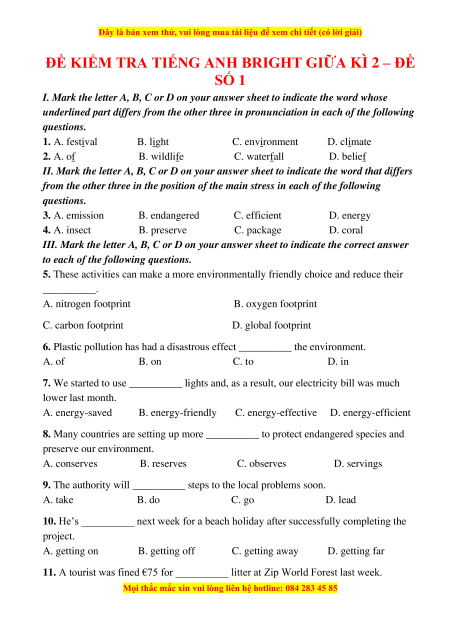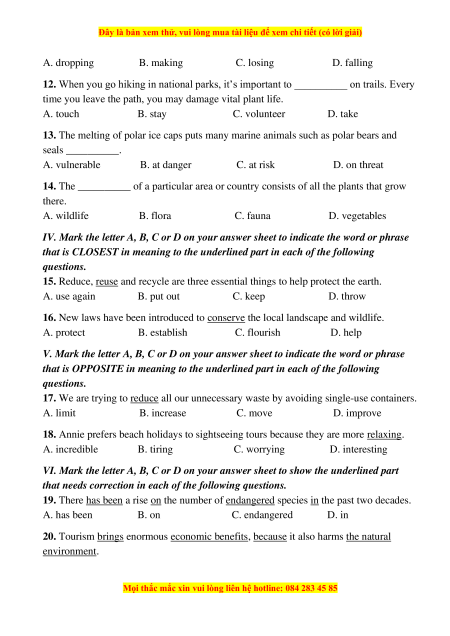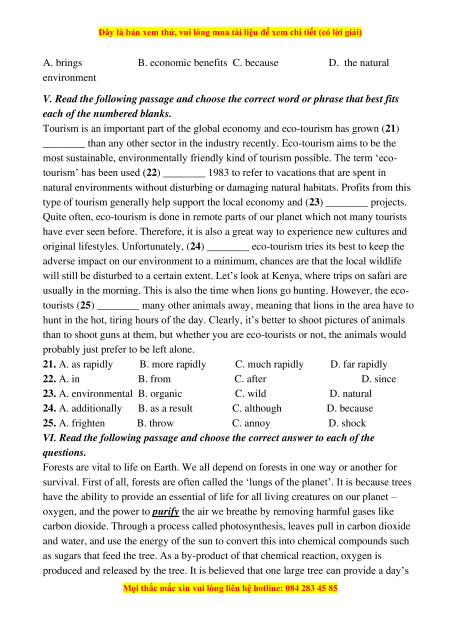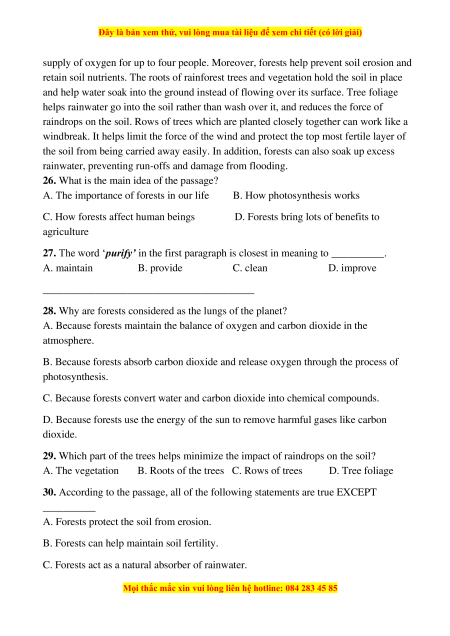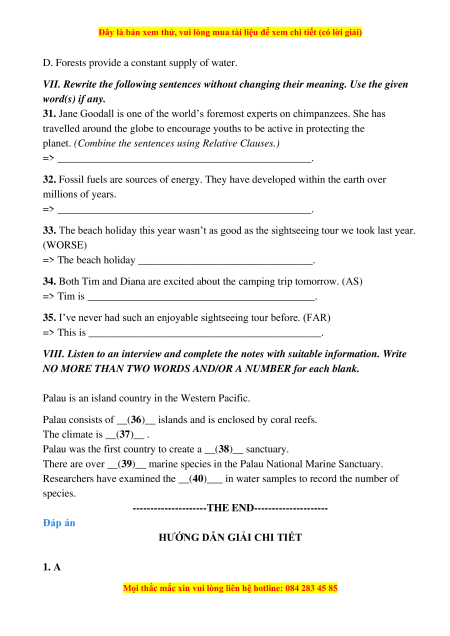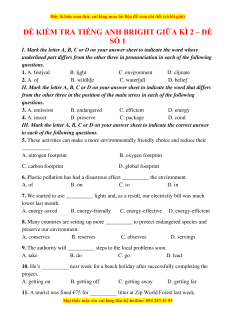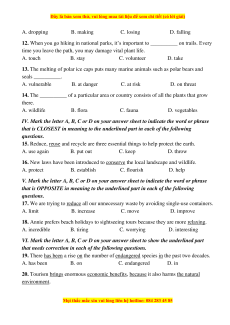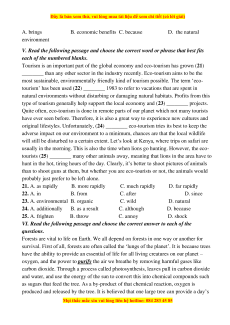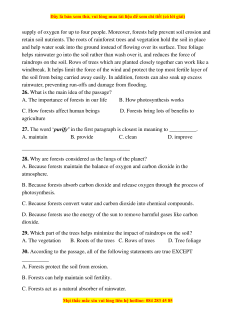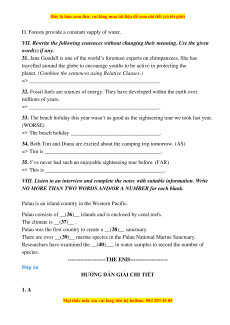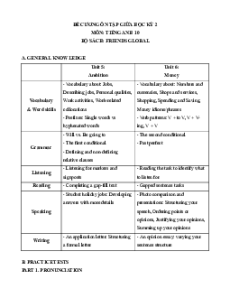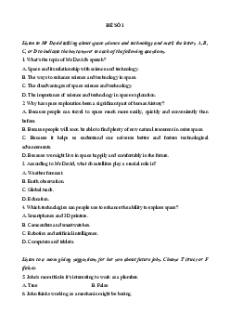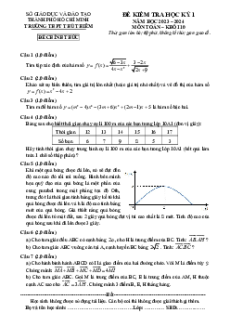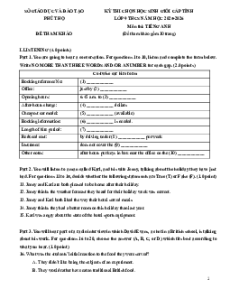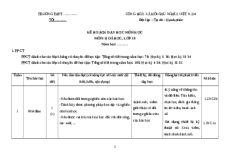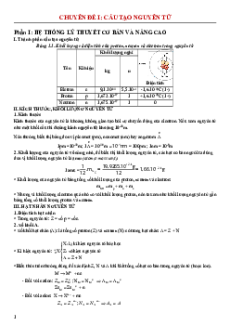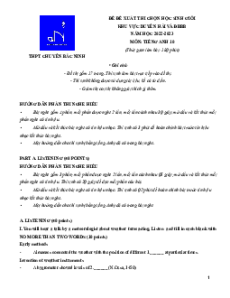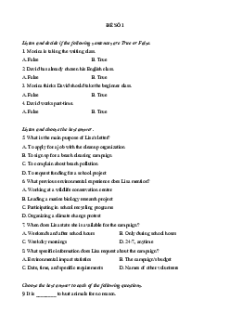ĐỀ KIỂM TRA TIẾNG ANH BRIGHT GIỮA KÌ 2 – ĐỀ SỐ 1
I. Mark the letter A, B, C or D on your answer sheet to indicate the word whose
underlined part differs from the other three in pronunciation in each of the following questions.
1. A. festival B. light C. environment D. climate
2. A. of B. wildlife C. waterfall D. belief
II. Mark the letter A, B, C or D on your answer sheet to indicate the word that differs
from the other three in the position of the main stress in each of the following questions.
3. A. emission B. endangered C. efficient D. energy
4. A. insect B. preserve C. package D. coral
III. Mark the letter A, B, C or D on your answer sheet to indicate the correct answer
to each of the following questions.
5. These activities can make a more environmentally friendly choice and reduce their __________.
A. nitrogen footprint B. oxygen footprint
C. carbon footprint D. global footprint
6. Plastic pollution has had a disastrous effect __________ the environment. A. of B. on C. to D. in
7. We started to use __________ lights and, as a result, our electricity bill was much lower last month.
A. energy-saved B. energy-friendly C. energy-effective D. energy-efficient
8. Many countries are setting up more __________ to protect endangered species and preserve our environment.
A. conserves B. reserves C. observes D. servings
9. The authority will __________ steps to the local problems soon. A. take B. do C. go D. lead
10. He’s __________ next week for a beach holiday after successfully completing the project.
A. getting on B. getting off C. getting away D. getting far
11. A tourist was fined €75 for __________ litter at Zip World Forest last week.
A. dropping B. making C. losing D. falling
12. When you go hiking in national parks, it’s important to __________ on trails. Every
time you leave the path, you may damage vital plant life.
A. touch B. stay C. volunteer D. take
13. The melting of polar ice caps puts many marine animals such as polar bears and seals __________.
A. vulnerable B. at danger C. at risk D. on threat
14. The __________ of a particular area or country consists of all the plants that grow there.
A. wildlife B. flora C. fauna D. vegetables
IV. Mark the letter A, B, C or D on your answer sheet to indicate the word or phrase
that is CLOSEST in meaning to the underlined part in each of the following questions.
15. Reduce, reuse and recycle are three essential things to help protect the earth.
A. use again B. put out C. keep D. throw
16. New laws have been introduced to conserve the local landscape and wildlife.
A. protect B. establish C. flourish D. help
V. Mark the letter A, B, C or D on your answer sheet to indicate the word or phrase
that is OPPOSITE in meaning to the underlined part in each of the following questions.
17. We are trying to reduce all our unnecessary waste by avoiding single-use containers.
A. limit B. increase C. move D. improve
18. Annie prefers beach holidays to sightseeing tours because they are more relaxing.
A. incredible B. tiring C. worrying D. interesting
VI. Mark the letter A, B, C or D on your answer sheet to show the underlined part
that needs correction in each of the following questions.
19. There has been a rise on the number of endangered species in the past two decades.
A. has been B. on C. endangered D. in
20. Tourism brings enormous economic benefits, because it also harms the natural environment.
A. brings B. economic benefits C. because D. the natural environment
V. Read the following passage and choose the correct word or phrase that best fits
each of the numbered blanks.
Tourism is an important part of the global economy and eco-tourism has grown (21)
________ than any other sector in the industry recently. Eco-tourism aims to be the
most sustainable, environmentally friendly kind of tourism possible. The term ‘eco-
tourism’ has been used (22) ________ 1983 to refer to vacations that are spent in
natural environments without disturbing or damaging natural habitats. Profits from this
type of tourism generally help support the local economy and (23) ________ projects.
Quite often, eco-tourism is done in remote parts of our planet which not many tourists
have ever seen before. Therefore, it is also a great way to experience new cultures and
original lifestyles. Unfortunately, (24) ________ eco-tourism tries its best to keep the
adverse impact on our environment to a minimum, chances are that the local wildlife
will still be disturbed to a certain extent. Let’s look at Kenya, where trips on safari are
usually in the morning. This is also the time when lions go hunting. However, the eco-
tourists (25) ________ many other animals away, meaning that lions in the area have to
hunt in the hot, tiring hours of the day. Clearly, it’s better to shoot pictures of animals
than to shoot guns at them, but whether you are eco-tourists or not, the animals would
probably just prefer to be left alone.
21. A. as rapidly B. more rapidly C. much rapidly D. far rapidly
22. A. in B. from C. after D. since
23. A. environmental B. organic C. wild D. natural
24. A. additionally B. as a result C. although D. because
25. A. frighten B. throw C. annoy D. shock
VI. Read the following passage and choose the correct answer to each of the questions.
Forests are vital to life on Earth. We all depend on forests in one way or another for
survival. First of all, forests are often called the ‘lungs of the planet’. It is because trees
have the ability to provide an essential of life for all living creatures on our planet –
oxygen, and the power to purify the air we breathe by removing harmful gases like
carbon dioxide. Through a process called photosynthesis, leaves pull in carbon dioxide
and water, and use the energy of the sun to convert this into chemical compounds such
as sugars that feed the tree. As a by-product of that chemical reaction, oxygen is
produced and released by the tree. It is believed that one large tree can provide a day’s
supply of oxygen for up to four people. Moreover, forests help prevent soil erosion and
retain soil nutrients. The roots of rainforest trees and vegetation hold the soil in place
and help water soak into the ground instead of flowing over its surface. Tree foliage
helps rainwater go into the soil rather than wash over it, and reduces the force of
raindrops on the soil. Rows of trees which are planted closely together can work like a
windbreak. It helps limit the force of the wind and protect the top most fertile layer of
the soil from being carried away easily. In addition, forests can also soak up excess
rainwater, preventing run-offs and damage from flooding.
26. What is the main idea of the passage?
A. The importance of forests in our life B. How photosynthesis works
C. How forests affect human beings D. Forests bring lots of benefits to agriculture
27. The word ‘purify’ in the first paragraph is closest in meaning to __________.
A. maintain B. provide C. clean D. improve
________________________________________
28. Why are forests considered as the lungs of the planet?
A. Because forests maintain the balance of oxygen and carbon dioxide in the atmosphere.
B. Because forests absorb carbon dioxide and release oxygen through the process of photosynthesis.
C. Because forests convert water and carbon dioxide into chemical compounds.
D. Because forests use the energy of the sun to remove harmful gases like carbon dioxide.
29. Which part of the trees helps minimize the impact of raindrops on the soil?
A. The vegetation B. Roots of the trees C. Rows of trees D. Tree foliage
30. According to the passage, all of the following statements are true EXCEPT __________
A. Forests protect the soil from erosion.
B. Forests can help maintain soil fertility.
C. Forests act as a natural absorber of rainwater.
Bộ 7 đề thi giữa kì 2 Tiếng Anh 10 Bright có đáp án
2.8 K
1.4 K lượt tải
130.000 ₫
MUA NGAY ĐỂ XEM TOÀN BỘ TÀI LIỆU
CÁCH MUA:
- B1: Gửi phí vào TK:
1133836868- CT TNHH DAU TU VA DV GD VIETJACK - Ngân hàng MB (QR) - B2: Nhắn tin tới Zalo VietJack Official ( nhấn vào đây ) để xác nhận thanh toán và tải tài liệu - giáo án
Liên hệ ngay Hotline hỗ trợ: 084 283 45 85
Chúng tôi đảm bảo đủ số lượng đề đã cam kết hoặc có thể nhiều hơn, tất cả có BẢN WORD, LỜI GIẢI CHI TIẾT và tải về dễ dàng.
Để tải tài liệu gốc về máy bạn click vào nút Tải Xuống ở trên!
- Tailieugiaovien.com.vn giới thiệu bộ 7 đề thi giữa kì 2 kèm file nghe môn Tiếng anh 10 Bright mới nhất nhằm giúp Giáo viên có thêm tài liệu tham khảo ra đề thi Tiếng anh lớp 10.
- File word có lời giải chi tiết 100%.
- Mua trọn bộ sẽ tiết kiệm hơn tải lẻ 50%.
Đánh giá
4.6 / 5(2758 )5
4
3
2
1
Trọng Bình
Tài liệu hay
Giúp ích cho tôi rất nhiều
Duy Trần
Tài liệu chuẩn
Rất thích tài liệu bên VJ soạn (bám sát chương trình dạy)
